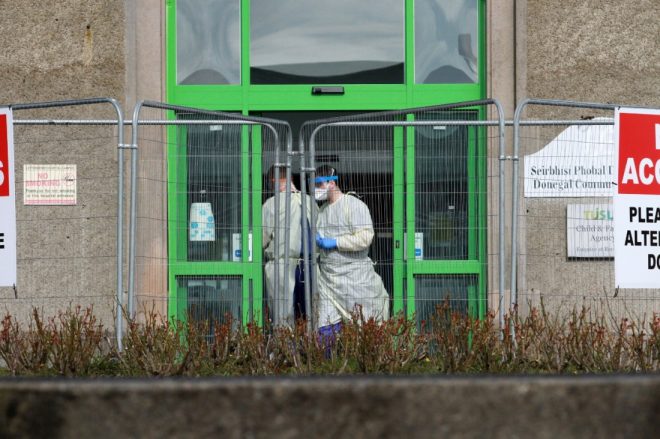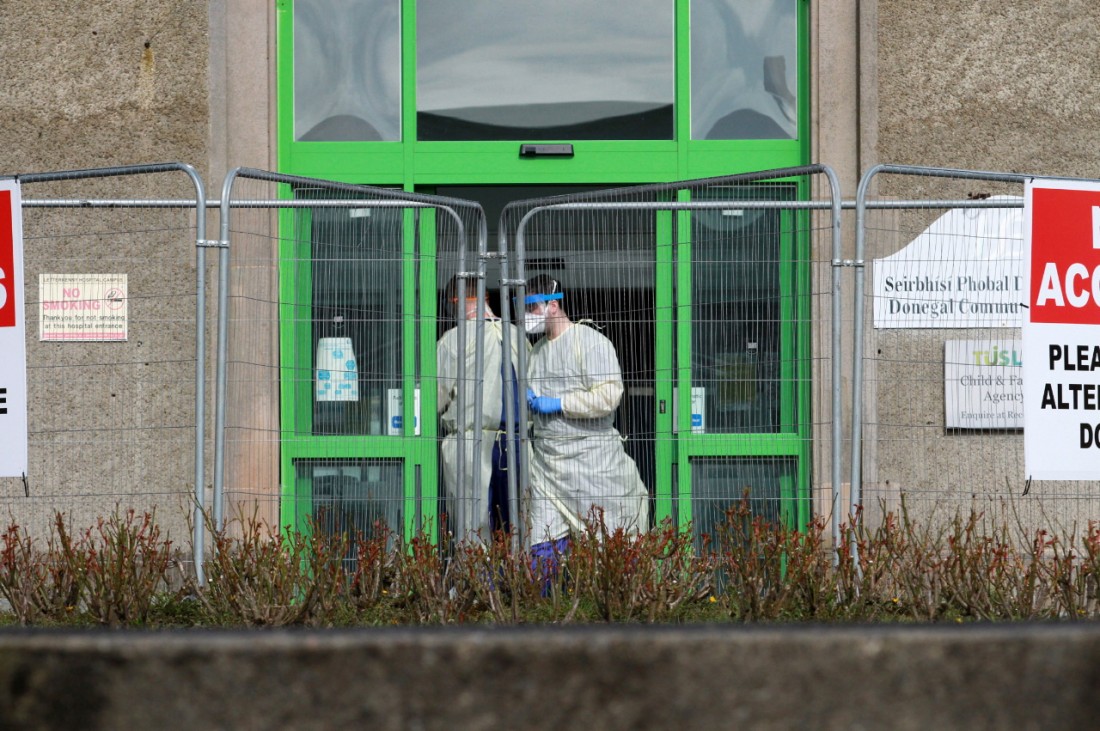
There were 204 new confirmed cases of Covid-19 in Ireland today, bringing the total number of patients in the Republic to 1,329. A seventh patient has died in the Republic while the north is reporting five deaths.
The patient is a male and in the east of the country, with an underlying health condition.
The number of Covid-19 cases in Northern Ireland has doubled in four days. There are now 172 confirmed cases. There were 86 reported on March 20th. There are 1,501 confirmed cases on the island of Ireland.
There are now eleven confirmed cases in Donegal.
The HSE is now working to identify any contacts the patients may have had to provide them with information and advice to prevent further spread.
To date, 17,992 tests have been carried out in laboratories across the country, as of midnight last night.
Today’s data from HPSC, as of midnight, Sunday 22nd March (965 cases), reveals:
· 55% are male and 45% are female, with 44 clusters involving 243 cases
· the median age of confirmed cases is 45 years
· 277 cases (29%) have been hospitalised
· Of those hospitalised, 36 cases have been admitted to ICU
· 247 cases (26%) are associated with healthcare workers
· Dublin has the highest number of cases at 535, (55% of all cases) followed by Cork with 123 cases (13%)
· Of those for whom transmission status is known: community transmission accounts for 47%, close contact accounts for 23%, travel abroad accounts for 31%
The Department of Health has today launched a new COVID-19 Information Dashboard; providing up to date case information – gov.ie/covid19Dashboard
The National Public Health Emergency Team met last night and this morning to review Ireland’s response to COVID-19 preparedness.
The following recommendations were made by the National Public Health Emergency Team and today adopted by Government:
· Ireland has adopted the World Health Organisation case definition for COVID-19; A patient with fever and at least one sign of respiratory disease e.g. cough, shortness of breath.
· Individuals should work from home unless attendance at the workplace is absolutely essential.
· Non-essential retail outlets are to close to members of the public. Essential retail outlets are to implement strict physical distancing measures.
· All sporting events are cancelled, including those behind closed doors.
· All playgrounds and holiday/ caravan parks are closed.
· All organised social indoor or outdoor events of any size are not to take place.
· All cafes and restaurants are to operate on a take-away or delivery basis. Strict physical distancing measures apply to queuing for this service.
· People should not use public transport unless it is absolutely necessary.
A comprehensive list of new measures is available here.
Dr. Tony Holohan, Chief Medical Officer, Department of Health, said; “We are now in the crucial weeks of our response to COVID-19. All actions we take are based on epidemiological evidence and in proportion to our experience on this island.
“As we learn more about this disease, we are prioritising who will be tested. If you are not in a priority group, you might not be tested. However, if you have the symptoms, assume you have COVID-19 and isolate yourself.”
Dr. Ronan Glynn, Deputy Chief Medical Officer, Department of Health, said; “Priority groups for testing include close contacts of a confirmed case with symptoms, healthcare workers with symptoms and people who are vulnerable with symptoms.
“Whether you are tested or not, the advice remains the same; if you have any symptoms, assume you have COVID-19 and isolate yourself for 14 days to help stop the spread of this disease. Household contacts of a suspected case should restrict their contacts for 14 days.”
Dr. Colm Henry, Chief Clinical Officer, HSE, said; “14,692 samples have been tested at the NVRL, of which 93% returned negative.
“Ireland is following WHO advice to “test, test, test” and is in the top quartile in terms of number of tests we have performed per capita. This, alongside physical distancing measures and intensive contact tracing, is deemed best practice internationally for dealing with this threat.”
Analysis of public health contact tracing has shown that the average number of close contacts per confirmed case has decreased from 20+ to the region of 5 contacts. This shows that the public is following health advise and actively limiting the amount of people they engage with.
NPHET will meet again on Thursday 26th March, to review Ireland’s ongoing preparedness and response to COVID-19.
Meanwhile, a multi-billion euro package will see the government pay up to 410 euro a week of wages while workers and the self-employed who have lost jobs from the virus will also see payments increased.
As part of the package, the government will pay a temporary wage subsidy of 70% of take home pay up to a maximum weekly tax free amount of 410 euro per week to help affected companies keep paying their employees. This scheme is open to impacted employers in all sectors.
Cases by county
| Carlow | ≤5 | 0% |
| Cavan | ≤5 | 1% |
| Clare | 11 | 1% |
| Cork | 123 | 13% |
| Donegal | 11 | 1% |
| Dublin | 535 | 56% |
| Galway | 35 | 4% |
| Kerry | 15 | 1% |
| Kildare | 25 | 3% |
| Kilkenny | 16 | 2% |
| Laois | 8 | 1% |
| Leitrim | ≤5 | 0% |
| Limerick | 19 | 2% |
| Longford | ≤5 | 1% |
| Louth | 16 | 2% |
| Mayo | 9 | 1% |
| Meath | 16 | 2% |
| Monaghan | ≤5 | 0% |
| Offaly | 13 | 1% |
| Roscommon | ≤5 | 0% |
| Sligo | 8 | 1% |
| Tipperary | 20 | 2% |
| Waterford | 13 | 1% |
| Westmeath | 21 | 2% |
| Wexford | ≤5 | 0% |
| Wicklow | 28 | 3% |
Hospitalised cases by age group
| <5 | 2 | 1% |
| 5 – 14 | 2 | 1% |
| 15 – 24 | 15 | 5% |
| 25 – 34 | 36 | 13% |
| 35 – 44 | 26 | 9% |
| 45 – 54 | 52 | 18% |
| 55 – 64 | 43 | 16% |
| 65+ | 101 | 37% |
*All statistics measured at midnight on Sunday 22 March.










